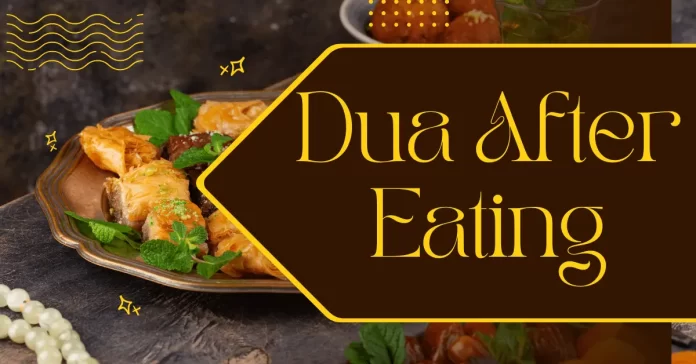Introduction to Dua After Eating
In many cultures and faiths around the world, the act of eating is not just a physical necessity but a spiritual experience. It’s a moment to pause, reflect, and express gratitude for the sustenance provided. One beautiful tradition that embodies this sentiment is the practice of reciting a dua (prayer) after eating. In this blog, we delve into the significance of dua after eating, its spiritual benefits, and how incorporating this practice into our daily lives can enrich our overall well-being.
Understanding Dua in Islamic Tradition
In Islam, dua is an integral aspect of worship, representing a direct connection between the individual and the Divine. It’s a form of supplication where believers express their needs, hopes, and gratitude to Allah. Dua after eating is considered a Sunnah (tradition) of Prophet Muhammad (peace be upon him), emphasizing the importance of acknowledging and thanking Allah for the blessings of food.
Dua After Eating in Arabic:
الْحَمْدُ لِلَّهِ الَّذِي أَطْعَمَنَا وَسَقَانَا وَجَعَلَنَا مِنَ الْمُسْلِمِينَ
Transliteration:
Alhamdu lillahi alladhi at’amana wa saqana wa ja’alana min al-muslimin.
Meaning:
“All praise is due to Allah who has fed us and given us drink, and made us Muslims.”
The Spiritual Significance of Dua After Eating
When we partake in a meal, we’re nourishing not only our bodies but also our souls. The act of consuming food is a reminder of Allah’s abundant mercy and provision. Reciting a dua after eating serves as a spiritual anchor, grounding us in gratitude and humility. It’s a moment of mindfulness where we recognize the source of our sustenance and express our appreciation for the blessings bestowed upon us.
The Etiquette of Dua After Eating
In Islamic tradition, there are specific etiquettes to observe when reciting dua after eating. These include praising Allah before and after the meal, expressing gratitude for the food and drink, and seeking His forgiveness for any shortcomings in our conduct. By adhering to these etiquettes, we not only fulfill a religious obligation but also cultivate a deeper sense of reverence and mindfulness in our daily lives.
Benefits of Incorporating Dua After Eating
Beyond its spiritual significance, reciting dua after eating offers numerous benefits for our mental, emotional, and physical well-being. It serves as a reminder to eat mindfully, fostering a healthier relationship with food and preventing overindulgence. Moreover, expressing gratitude through dua promotes positivity and contentment, reducing stress and anxiety levels.
Strengthening Family and Community Bonds
Dua after eating also plays a significant role in strengthening familial and communal ties. When families gather around the dinner table and collectively recite dua, it fosters a sense of unity, love, and mutual respect. Similarly, sharing meals with friends and neighbors and inviting them to join in the dua cultivates a spirit of generosity and hospitality, deepening interpersonal connections and fostering a sense of belonging.
Integrating Dua After Eating into Daily Routine
Incorporating dua after eating into our daily routine doesn’t require elaborate rituals or extra time. It’s a simple yet profound practice that can be seamlessly integrated into our lives. Whether we’re dining alone or with others, taking a moment to silently recite dua allows us to pause, reflect, and connect with our spiritual selves amidst the hustle and bustle of daily life.
Conclusion: Cultivating Gratitude Through Dua After Eating
In conclusion, dua after eating is more than just a religious obligation; it’s a powerful expression of gratitude and mindfulness. By incorporating this practice into our daily lives, we not only strengthen our spiritual connection with the Divine but also cultivate a deeper appreciation for the blessings of food and the company of loved ones. Let us embrace this beautiful tradition with sincerity and humility, recognizing the profound impact it can have on our overall well-being.
With each heading leading into a comprehensive discussion, this blog aims to provide readers with a holistic understanding of the significance of dua after eating and inspire them to incorporate this meaningful practice into their daily lives.
Frequently Asked Questions (FAQs)
1. What is the dua?
Dua after eating is a practice in Islam where one expresses gratitude to Allah after consuming a meal. It involves reciting prayers of thanks for the food provided.
2. Why is this dua important?
Dua after eating is important as it fosters a sense of gratitude, mindfulness, and spiritual connection with the Divine. It acknowledges the blessings of food and nourishment bestowed upon us.
3. How do I make this dua eating?
To make dua after eating, one can say phrases such as “Alhamdulillah” (All praise is due to Allah) and “Allahumma barik lana fi ma razaqtana” (O Allah, bless us in what You have provided us).
4. Can this dua be said silently or aloud?
Dua after eating can be said either silently or aloud, depending on personal preference. The most important aspect is sincerity and intentionality in expressing gratitude.
5. Is this dua only for Muslims?
While dua after eating is rooted in Islamic tradition, the practice of expressing gratitude after meals can be found in many cultures and religions. It is a universal concept of acknowledging blessings.
6. Can this dua be made in any language?
Yes, dua after eating can be made in any language that one is comfortable with. The essence of the dua lies in the sincerity of the gratitude expressed, rather than the specific language used.

